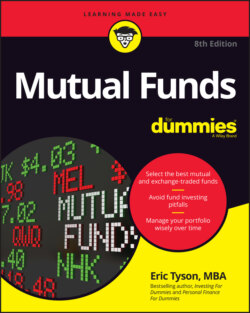Читать книгу Mutual Funds For Dummies - Eric Tyson - Страница 87
SHOULD YOU JOIN AN INVESTMENT CLUB?
ОглавлениеInvestment clubs are a little bit like having your own hands-on mutual fund. Each club member chips in some money. Then the group gets together for periodic meetings to discuss stocks and to make investment decisions. (Although investment clubs could, of course, select other investments, such as bonds, most clubs choose stocks.)
These groups can be valuable as an educational forum if you utilize good information sources. If the group members are somewhat clueless and the meetings are rambling, these groups can end up degenerating into the blind leading the blind.
Investment clubs may have social or hobby value (which are most clubs’ major benefits), but they can hurt your checkbook more than they help. Consider the following:
The members of investment clubs are part-time amateurs. You could end up making some poor decisions and losing money (or not making nearly as much as you would if you’d been in some good mutual funds).
It’s highly unlikely that everyone in the group is in the same tax situation. Thus, the club’s investments may work for some members’ tax situations but not for others’.
Beware of stockbrokers (and others trolling for prospective clients) who’ve been known to participate in investment clubs and volunteer as leaders. Although their participation may be harmless, more often than not, these brokers have a hidden agenda to reel in new business clients.
Consider forming a financial reading club and discussion group rather than an investment club. You can get together and discuss financial periodicals, books, and investment strategies. This way, you can advance your level of financial knowledge; find out about new resources from others; and enjoy the fun, camaraderie, and other benefits that come from doing things in a group.
Better yet, join a bowling league or a softball team and leave the investing to fund managers!
In my experience, more than a few otherwise smart, fun-loving people choose to invest in individual securities because they think that they’re smarter or luckier than the rest. If you’re like most people, I can safely say that, in the long run, your individually selected stocks and bonds won’t outperform those of a full-time investment professional.
I’ve noticed a distinct contrast between the sexes on this issue (which is backed up by research). Perhaps because of differences in how people are raised, testosterone levels, or whatever, men tend to have more of a problem taming their egos and admitting that they’re better off turning the stock and bond selection over to a pro.
Before you set out to compete in the investment world, get smarter and wiser. The latest edition of my book Investing For Dummies (Wiley) explains how to analyze company financial statements and compare and select stocks and bonds as well as to use the best investment research sources such as Value Line. Also, don’t overlook the opportunity to piggyback all the research and knowledge of the best money managers. By using the lists of best funds recommended in this book, you can use those funds’ reports to figure out what stocks and bonds some of the most talented money managers in the world are buying. (Note: The listing of a fund’s portfolio may be several months out of date as funds are only required to report their holdings quarterly.)
